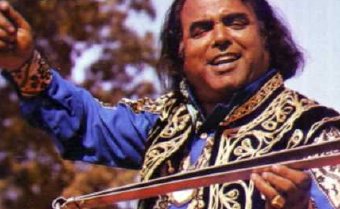Adil Najam
 I am still in the groove of Arif Lohar’s Coke Studio performance. I find it especially invigorating to listen to Arif’s version back to back with his father Alam Lohar’s. In doing that, I just stumbled on this wonderful recording from Alam Lohar: England (read, Englaaand) di Jugi. It really is worth a listen.
I am still in the groove of Arif Lohar’s Coke Studio performance. I find it especially invigorating to listen to Arif’s version back to back with his father Alam Lohar’s. In doing that, I just stumbled on this wonderful recording from Alam Lohar: England (read, Englaaand) di Jugi. It really is worth a listen.
Funny at first, but not entirely. Find out what happens to Jugni in Englaand.
Jugni san kuch wej waTa kay
paisey agent day hath phaRa kay
gharouN bej kay aa gaye gaaN
Englaan di Jugi kendi aaaN
Alam Lohar was, of course, a funny fellow. Part of the charm of his performance was always the quips an repartee of his introduction to and interventions in his own songs. His performances were truly ‘performances’ and not just the song. I have not yet found something representing that aspect of Alam Lohar on YouTube, but this (not as good) film clip is at least one example of what we have been calling ‘Ultimate Lollywood’ and that can do to even an artist as amazing as Alam Lohar:



















































Love the ‘paisey agent day hath phara key’ line. How authentic
@Faisal Sattar. Your story is cute, but not true. Jugni is an ancient Punjabi form of storytelling which goes back centuries and where new stories are woven into the adventures of Jugni (just like Lohar does it here), I am sure Jugnis were also written about the Jubillee, but they originated much much before that.
Love the selection. Specially the first one. What a nice way to tell the story. You made my weekend.
I just did a bit of research on the origins of the “Jugni” and while one simple explanation is that is of course a “lady firefly” something interesting that I found was that it in 1897 the Diamond Jubilee of Queen Victoria was celebrated throughout the Empire and a Jubilee Flame was carried from city to city. When it came to India it was similarly carried around and in each city there was a celebration at the passage of the “Jubilee” flame. Some enterprising street poets/singers made a song about it and attached themselves to the procession, and thus the word “Jungi” actually comes from the Jubilee flame. I don’t know if this is historically true or not but it is pretty interesting.
Sweeet. So sweet.